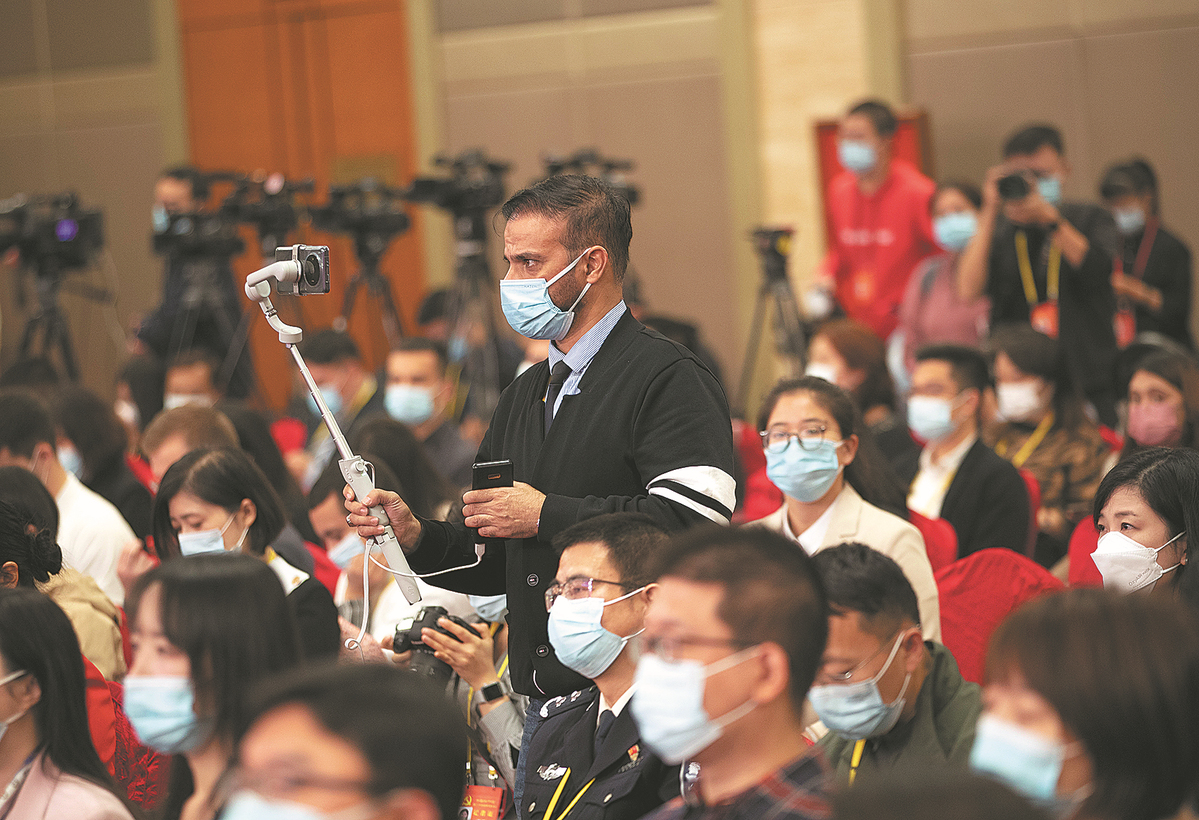Prosecuting authorities vow to improve public-interest litigation
08:57, October 20, 2022 China Daily

From left: Yin Bai, deputy secretary-general of the Political and Legal Affairs Commission of the Communist Party of China Central Committee; He Rong, vice-president of the Supreme People's Court; Tong Jianming, deputy procurator-general of the Supreme People's Procuratorate; Xu Ganlu, vice-minister of public security, and Zuo Li, vice-minister of justice, attend a news conference on the topic "Under the Guidance of Xi Jinping Thought on the Rule of Law, Strive to Build Higher-Standard Rule of Law in China" in Beijing on Wednesday. [Photo by ZOU HONG/CHINA DAILY]
Prosecuting authorities will improve the handling of public-interest litigation to better serve people in line with the concept of high-quality rule of law, a senior prosecutor said at a news conference on Wednesday.
The pledge by Tong Jianming, deputy procurator-general of the Supreme People's Procuratorate, China's top procuratorate, concurred with the report Xi Jinping delivered on Sunday at the opening session of the 20th National Congress of the Communist Party of China. The report highlighted the importance of improving the public-interest litigation system.
"We'll resolutely implement the requirement to contribute to the modernization of the national governance system and capacity," said Tong, who is also a congress delegate.
Tong said that prosecuting authorities across the country have explored such a litigation system in recent years. This has improved people's lives and encouraged government agencies to better perform their duties.
Over the past five years, prosecutors nationwide have dealt with over 710,000 public-interest lawsuits, concerning such issues as the environment and ecology, and product, food and drug safety, he said.
Prosecutors can file lawsuits against poorly performing government departments or businesses, according to 2017 revisions to both the Administrative Procedure Law and the Civil Procedure Law.
The revisions initially covered cases in four categories — environmental protection, food and drug safety, State-asset preservation and land-rights transfers.
"Since 2018, prosecutors have had the right to initiate such lawsuits in eight new fields, including protections of the rights and interests of heroes and martyrs, juveniles, personal information, telecom fraud, monopolies and quality safety of agricultural products," Tong said.
Subsequently, 20.7 percent of public-interest litigation cases have been related to these new categories, he added.
Establishing the system of public-interest litigation made by prosecutors as a significant plan from the central leadership and crucial move toward advancing the modernization of the nation's governance system and capacity was first put forward during the fourth plenary session of the 18th CPC Central Committee in 2014.

A journalist records a video while attending the news conference on Wednesday in Beijing. [Photo by ZOU HONG/CHINA DAILY]
Three years later, after a successful pilot program, public-interest litigation was rolled out nationwide in line with a decision by China's top legislature. It was written into the laws that give prosecutors the power to sue agencies with poor performance to protect public rights.
The central leadership decided to expand the scope of such litigation at the fourth plenary session of the 19th CPC Central Committee in 2019 to uphold and advance the rule of law.
Prosecutors are generally asked to first offer suggestions for rectification to government organs or businesses before initiating litigation and then taking them to court only if they fail to resolve problems.
"Our suggestions were followed about 98 percent of the time, meaning government agencies corrected mistakes before we sued them," Tong said.
"We then initiated 35,000 lawsuits against those who failed to rectify the issues. The courts ruled against those we sued in 99.7 percent of these cases."
The consequential safeguarding of people's rights and interests has also significantly boosted their sense of security over the past decade, said Vice-Minister of Public Security Xu Ganlu.
Xu added that China is one of the safest countries in the world. The number of cases related to eight major violent crimes, including homicide and rape, decreased 64 percent between 2012 and 2021.

